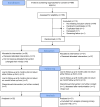Post stroke intervention trial in fatigue (POSITIF): Randomised multicentre feasibility trial
- PMID: 35866206
- PMCID: PMC9574032
- DOI: 10.1177/02692155221113908
Post stroke intervention trial in fatigue (POSITIF): Randomised multicentre feasibility trial
Abstract
Objective: To test the feasibility of a telephone delivered intervention, informed by cognitive behavioural principles, for post-stroke fatigue, and estimated its effect on fatigue and other outcomes.
Design: Randomised controlled parallel group trial.
Setting: Three Scottish stroke services.
Subjects: Stroke survivors with fatigue three months to two years post-stroke onset.
Interventions: Seven telephone calls (fortnightly then a 'booster session' at 16 weeks) of a manualised intervention, plus information about fatigue, versus information only.
Main measures: Feasibility of trial methods, and collected outcome measures (fatigue, mood, anxiety, social participation, quality of life, return to work) just before randomisation, at the end of treatment (four months after randomisation) and at six months after randomisation.
Results: Between October 2018 and January 2020, we invited 886 stroke survivors to participate in postal screening: 188/886 (21%) returned questionnaires and consented, of whom 76/188 (40%) were eligible and returned baseline forms; 64/76 (84%) returned six month follow-up questionnaires. Of the 39 allocated the intervention, 23 (59%) attended at least four sessions. At six months, there were no significant differences between the groups (adjusted mean differences in Fatigue Assessment Scale -0.619 (95% CI -4.9631, 3.694; p = 0.768), the Generalised Anxiety Disorder 7 -0.178 (95% CI -3.823, 3.467, p = 0.92), and the Patient Health Questionnaire -0.247 (95% CI -2.935, 2.442, p = 0.851). There were no between-group differences in quality of life, social participation or return to work.
Conclusion: Patients can be recruited to a trial of this design. These data will inform the design of further trials in post-stroke fatigue.
Keywords: Fatigue; randomized controlled trial; stroke.
Conflict of interest statement
The author(s) declared no potential conflicts of interest with respect to the research, authorship, and/or publication of this article.
Similar articles
-
Study protocol for POSITIF, a randomised multicentre feasibility trial of a brief cognitive-behavioural intervention plus information versus information alone for the treatment of post-stroke fatigue.Pilot Feasibility Stud. 2020 Jun 15;6:84. doi: 10.1186/s40814-020-00622-0. eCollection 2020. Pilot Feasibility Stud. 2020. PMID: 32549995 Free PMC article.
-
Cognitive-behavioural therapy compared with standardised medical care for adults with dissociative non-epileptic seizures: the CODES RCT.Health Technol Assess. 2021 Jun;25(43):1-144. doi: 10.3310/hta25430. Health Technol Assess. 2021. PMID: 34196269 Free PMC article. Clinical Trial.
-
Fluoxetine to improve functional outcomes in patients after acute stroke: the FOCUS RCT.Health Technol Assess. 2020 May;24(22):1-94. doi: 10.3310/hta24220. Health Technol Assess. 2020. PMID: 32452356 Free PMC article. Clinical Trial.
-
Telephone interventions for symptom management in adults with cancer.Cochrane Database Syst Rev. 2020 Jun 2;6(6):CD007568. doi: 10.1002/14651858.CD007568.pub2. Cochrane Database Syst Rev. 2020. PMID: 32483832 Free PMC article.
-
Behavioural modification interventions for medically unexplained symptoms in primary care: systematic reviews and economic evaluation.Health Technol Assess. 2020 Sep;24(46):1-490. doi: 10.3310/hta24460. Health Technol Assess. 2020. PMID: 32975190 Free PMC article.
Cited by
-
A roadmap for research in post-stroke fatigue: Consensus-based core recommendations from the third Stroke Recovery and Rehabilitation Roundtable.Int J Stroke. 2024 Feb;19(2):133-144. doi: 10.1177/17474930231189135. Epub 2023 Oct 12. Int J Stroke. 2024. PMID: 37424273 Free PMC article.
-
Audio-Based Care for Managing Chronic Conditions in Adults: A Systematic Review.Med Care. 2025 Feb 1;63(2):164-182. doi: 10.1097/MLR.0000000000002097. Epub 2025 Jan 9. Med Care. 2025. PMID: 39791849 Free PMC article.
-
Fatigue After Stroke Educational Recovery Program: A Prospective, Phase III, Randomized Controlled Trial.J Am Heart Assoc. 2025 Jan 7;14(1):e034441. doi: 10.1161/JAHA.124.034441. Epub 2024 Dec 24. J Am Heart Assoc. 2025. PMID: 39719403 Free PMC article. Clinical Trial.
-
What is the effect of education on fatigue in adults with neurological conditions? A systematic review and meta-analysis.Clin Rehabil. 2025 Aug;39(8):1019-1033. doi: 10.1177/02692155251351510. Epub 2025 Jun 22. Clin Rehabil. 2025. PMID: 40545627 Free PMC article.
-
A roadmap for research in post-stroke fatigue: Consensus-based core recommendations from the third Stroke Recovery and Rehabilitation Roundtable.Neurorehabil Neural Repair. 2024 Jan;38(1):7-18. doi: 10.1177/15459683231209170. Epub 2023 Oct 14. Neurorehabil Neural Repair. 2024. PMID: 37837346 Free PMC article.
References
-
- Annoni J-M, Staub F, Bogousslavsky J, et al. Frequency, characterisation and therapies of fatigue after stroke. Neurol Sci 2008; 29: S244–S246. - PubMed
-
- Hinkle JL, Becker KJ, Kim J, et al. On behalf of the American heart association council on cardiovascular and stroke nursing and stroke council poststroke fatigue: emerging evidence and approaches to management: a scientific statement for healthcare professionals from the American heart association. Stroke 2017; 48: e159–e170. - PubMed
-
- Stroke Association. Shaping stroke research to rebuild lives. The Stroke Priority Setting partnership results for investment. June 2021. Item code: A08C19 © Stroke Association 2021.
-
- Duncan F, Greig CA, Dennis MS, et al.. An exploratory longitudinal cohort study of associations of fatigue after stroke. Stroke 2015; 46: 1052–1058. - PubMed
Publication types
MeSH terms
Grants and funding
LinkOut - more resources
Full Text Sources
Medical


